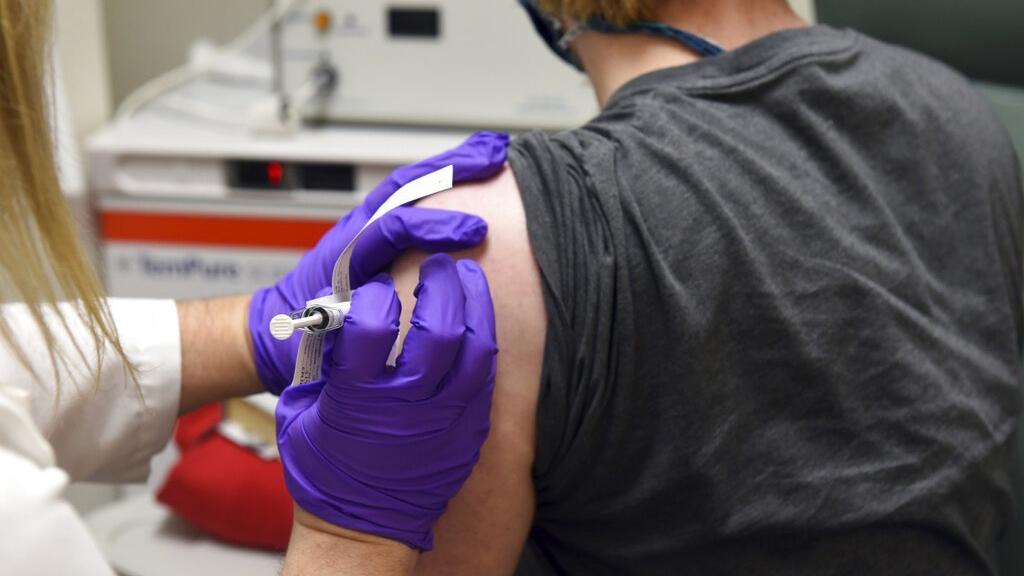 This May 4, 2020 file photo provided by the University of Maryland School of Medicine shows the first patient enrolled in Pfizer's coronavirus vaccine clinical trial at the university in Baltimore, the United States. (PHOTO / UNIVERSITY OF MARYLAND SCHOOL OF MEDICINE VIA AP)
This May 4, 2020 file photo provided by the University of Maryland School of Medicine shows the first patient enrolled in Pfizer's coronavirus vaccine clinical trial at the university in Baltimore, the United States. (PHOTO / UNIVERSITY OF MARYLAND SCHOOL OF MEDICINE VIA AP)
UNITED NATIONS / PARIS / NEW YORK / LONDON / CARIO / MEXICO CITY / BERLIN / GENEVA / MOSCOW / BRUSSELS / ZURICH / TBILISI / MADRID / HAVANA / PRAGUE / DUBLIN - The European Commission said on Wednesday it had sealed a deal with Pfizer and BioNTech for the supply of up to 300 million doses of their COVID-19 vaccine candidate.
Under the EU deal, the 27 EU countries could buy 200 million doses, and have an option to purchase another 100 million.
The purchases could take place only after the vaccine is authorized as effective and safe by the EU drug regulator.
Deliveries are expected to start by the end of this year, the companies said.
Global tally
The number of confirmed COVID-19 cases worldwide neared 51.4 million while the toll has topped 1.27 million, according to data compiled by Johns Hopkins University.
Russia
Russia's Sputnik V vaccine is 92 percent effective at protecting people from COVID-19 according to interim trial results, the country's sovereign wealth fund said on Wednesday, as Moscow rushes to keep pace with Western drugmakers in the race for a shot.
The initial results are the second to be published from a late-stage human trial of a COVID-19 vaccine. On Monday, Pfizer and BioNTech said their shot was also more than 90 percent effective.
Russia is planning to produce 500,000 doses of the Sputnik V vaccine in November, Deputy Prime Minister Tatiana Golikova said
The Russian Direct Investment Fund (RDIF), which has been backing its development and marketing it globally, said the Russian trial would continue for six more months and data from the study will also be published in a leading international medical journal following a peer review.
Independent experts said knowledge about the trial's design and protocol was sparse, making it extremely difficult to interpret the figures released on Wednesday.
Russia is planning to produce 500,000 doses of its main Sputnik V vaccine in November, Deputy Prime Minister Tatiana Golikova said in comments published on the same day.
Golikova also said post-registration trials of Russia's second COVID-19 vaccine, being developed by Siberia's Vector institute, are expected to start on Nov 15.
Russia reported a record high of 432 additional deaths related to the novel coronavirus on Wednesday, taking the official death toll to 31,593. Authorities also reported 19,851 new coronavirus infections in the last 24 hours, including 4,477 in the capital Moscow, bringing the national tally to 1,836,960.
South Africa
South Africa should aim to cover 10 percent of its population via a global coronavirus vaccine scheme while also negotiating directly with manufacturers, a group of experts has advised the government.
South Africa has recorded the most novel coronavirus infections of any African nation. While it has publicly expressed support for the COVAX scheme co-led by the World Health Organization, it has yet to make the formal commitment confirming its participation.
"There are two arms which we are recommending in terms of vaccine procurement: to make a commitment to COVAX but also to meet with various manufacturers to negotiate (potential bilateral deals)," Barry Schoub, chair of the Ministerial Advisory Committee on vaccines, told Reuters.
Schoub said it was too soon for South Africa to conclude agreements with individual manufacturers because officials would want to interrogate late-stage clinical trial data. But he said COVAX would provide an initial batch of "kick-off" vaccines with which to start protecting vulnerable people.
Ireland
Ireland's government may be able to reopen more of the economy than initially envisaged when the six week period at the highest level of COVID-19 restrictions ends on Dec 1, Prime Minister Micheal Martin said on Wednesday.
Ireland shut non-essential retail and limited restaurants and pubs to takeaway three weeks ago under Level 5 curbs with the aim of returning to Level 3, which would reopen all shops but only allow outdoor food and drink service to small numbers.
Ireland's 14-day incidence of 152 cases per 100,000 is the fourth lowest of the 31 countries monitored by the European Centre for Disease Prevention and Control (ECDC), having fallen 51 percent compared to the previous two weeks.
The government has also eased some of the European Union's toughest national travel restrictions, in line with the bloc's new "traffic light" system, which will likely see many Irish people working abroad return home for Christmas.
Slovakia
Slovakia's government will extend its state of emergency powers for the rest of the year to battle a surge in new coronavirus cases, Justice Minister Maria Kolikova said on Wednesday.
The state of emergency, put in place at the start of October and which had been due to expire on Nov 14, gives the government extra powers to implement strict measures.
Slovakia has so far recorded 79,181 confirmed cases and 414 deaths, according to a tally by Johns Hopkins University.
Moderna
Moderna Inc said on Wednesday it was on track to report early data from a late-stage trial of its experimental coronavirus vaccine later this month, two days after successful interim data from rival Pfizer Inc's vaccine.
Even after reporting interim data on the vaccine's effectiveness, Moderna may have to wait for two-month follow up safety data to apply for US emergency use authorization. It expects the safety data in the second half of this month.
Chief Executive Officer Stephane Bancel said it was not yet sure how effective its vaccine could be.
Czech Republic
The Czech Republic will reopen the first and second grades of elementary schools on Nov 18 as the latest data show a drop in new coronavirus cases in Europe's worst-hit country in the second wave, Education Minister Robert Plaga said on Wednesday.
All schools were ordered closed on Oct 14 and instruction was moved to distance learning. Kindergartens have remained open.
The Czech Republic reported 9,016 new coronavirus cases for Nov 10, a drop of 3,072 from a week earlier, Health Ministry data showed on Wednesday.
The new cases pushed the country's tally to 429,880.
The ministry also reported 249 more deaths, including 109 on Tuesday and adding in revisions to previous days. Altogether, 5,323 people have died.
Cuba
Havana airport will open to regular commercial flights on Sunday after being closed for seven and a half months due to the coronavirus pandemic, Cuban state-run media reported late on Tuesday, citing Cuba's Institute of Civil Aeronautics.
The move comes on time for what is traditionally the Caribbean island nation's high tourist season from November to March.
The Cuban government said it was holding off on opening up the capital until its coronavirus outbreak was sufficiently contained.
Authorities will test all international travelers for coronavirus on arrival, state-run media reported, and will levy a sanitary tariff in order to cover the extra costs of new hygiene protocols.
Cuba does not require travelers to take a coronavirus test prior to traveling but on Tuesday told tourism agencies to insist to visitors they monitor their own health before traveling after 11 of the 900 Russian tourists that arrived at a northern beach resort last week tested positive upon arrival.
Spain
The Spanish government will cut the value-added tax on health masks to 4 percent from 21 percent in a bid to reduce their retail price amid the coronavirus pandemic, Budget Minister Maria Jesus Montero said on Wednesday.
Meanwhile, Spain stands to receive its first vaccines against COVID-19 developed by Pfizer and its partner BioNTech in early 2021, the health minister said on Tuesday, under a deal being negotiated by the European Union.
Spain has recorded more than 1.38 million confirmed cases and nearly 40,000 deaths, according to a tally by Johns Hopkins University.
Ukraine
Ukraine's government will introduce on Wednesday a lockdown at weekends from Nov 14 to Nov 30 to strengthen measures to curb the rapid spread of the coronavirus, Prime Minister Denys Shmygal said, adding that the decision could be approved in a government meeting later in the day.
The decision will mean closing or restricting the activity of most businesses at weekends with the exception of grocery stores, pharmacies, hospitals and transport. The cabinet also stepped up restrictions on operations of restaurants, cinemas, gyms, and public events.
"If nothing is done, then on Dec 10-15 the medical system will no longer be able to receive people, there will be no places in hospitals even in the corridors," Shmygal said at a cabinet meeting.
Meanwhile, Ukrainian President Volodymyr Zelenskiy, who has tested positive for COVID-19, feels fine and continues to work, according to his wife Olena Zelenska, Interfax-Ukraine news agency reported on Tuesday.
Slovenia
Slovenia confirmed 40 additional COVID-19 deaths, its highest daily toll, bringing the number of deaths to 645.
Although Slovenia is in the third week of a partial lockdown, the health minister warned that harsher measures are needed.
Romania
Romania reported a daily record 203 more deaths, taking the number of deaths to 8,389, the highest toll in the European Union’s eastern wing.
Estonia
The Estonian cabinet has approved new measures, including requirements for anyone older than 12 to wear masks in public.
Georgia
Georgian Prime Minister Giorgi Gakharia has recovered from the coronavirus, his press office said on Wednesday, after he tested positive for COVID-19 on Nov 2.
Earlier on Wednesday, Georgia reported 2,911 new COVID-19 cases, bringing its tally to 66,561 with 566 deaths.
A total of 1,056 of the 2,911 new cases were confirmed in the capital city of Tbilisi, the National Center for Disease Control and Public Health said.
Switzerland
Switzerland has now reserved around 16 million doses of potential COVID-19 vaccines, the government said on Wednesday, after announcing a 3.2 million-dose reservation with COVAX and another 3 million-dose pact with Pfizer and BioNTech.
Switzerland previously reserved nearly 10 million doses of prospective vaccines from Moderna and AstraZeneca and has set aside 400 million Swiss francs (US$435.92 million) for purchases.
Swiss infections rose by 8,270 cases in a day, data from Swiss health authorities showed on Wednesday.
Total confirmed cases in Switzerland and neighboring principality Liechtenstein increased to 243,472 while the death toll rose by 86 to 2,769.
Hospitalizations swelled by 304 to 9,752 as the government deployed army personnel to help the hard-pressed healthcare system cope with the surge in admissions.
A vaccine is likely to need centralized vaccination locations, Swiss health experts said on Tuesday, as it must be stored at temperatures matching an Antarctic winter.
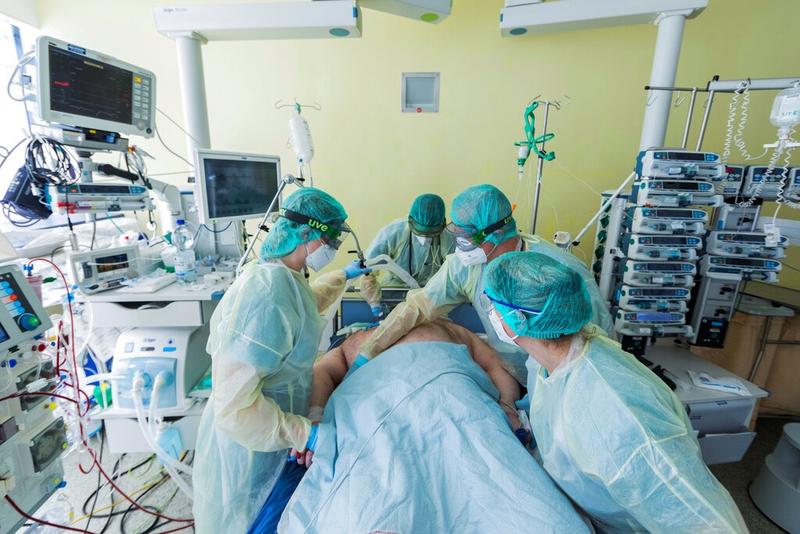 Medical workers care for a COVID-19 patient who is on a respirator in an intensive care unit at the University Hospital in Bonn, Germany, Nov 10, 2020. (ROLF VENNENBERND / DPA VIA AP)
Medical workers care for a COVID-19 patient who is on a respirator in an intensive care unit at the University Hospital in Bonn, Germany, Nov 10, 2020. (ROLF VENNENBERND / DPA VIA AP)
Germany
Germany on Wednesday reported the biggest spike in deaths linked to COVID-19 since April, and its health minister warned that the number of daily infections had not fallen enough yet to flatten the curve.
The country recorded 18,487 new infections and 261 deaths in a day, the Robert Koch Institute for infectious diseases said. The new figures brought the tally to 705,687 and the toll to 11,767.
As it was the case with the Spanish flu, we now also have to expect that the second wave will be more severe.
Angela Merkel, German chancellor
The coronavirus crisis remains severe despite recently positive news such as the development of vaccine, German Chancellor Angela Merkel said on Wednesday, adding that the government would have to deal with the pandemic throughout the winter.
"As it was the case with the Spanish flu, we now also have to expect that the second wave will be more severe," Merkel said during a video conference with the government's council of economic advisers.
While the daily tally has remained below 20,000 for four days straight, the number of deaths has been rising, and hospitals are reporting higher intensive care occupancy, Health Minister Jens Spahn said.
Saxony state premier Michael Kretschmer warned Christmas markets and religious services wouldn’t be possible with the current rates of infection.
German government spokeswoman Ulrike Demmer echoed Spahn's careful reading of the numbers but rejected a union call to consider a partial shuttering of schools and daycare centers after a spike in the number of teachers and pupils in quarantine.
The head of Germany's Teachers Union said that at least 300,000 pupils and more than 40,000 teachers were currently in quarantine, either because they had the virus or had come into contact with an infected individual.
UK
Britain is ready to roll out tens of millions of COVID-19 vaccines to the public with care-home residents and the elderly first in line for a jab that medics hope will allow the world to return to some semblance of normality.
England's Deputy Chief Medical Officer Jonathan Van-Tam said the country was ready to roll out a vaccine once regulators approved it as safe.
Britain's drugs regulator said on Wednesday that it would not compromise on safety when it comes to deciding whether or not to approve a COVID-19 vaccine.
The country has ordered a total of 350 million doses of the vaccines in development, including 40 million shots of Pfizer's jab.
Almost two-thirds of people in Britain say they would get vaccinated for COVID-19 but young people are far more likely to refuse a jab than older people, according to an opinion poll published on Wednesday.
Meanwhile, the boss of London’s Heathrow airport said the government needed to announce the go-ahead for passenger testing as soon as possible to allow time for the industry to be ready when lockdown measures in England end next month.
John Holland-Kaye said current rules mean that testing after arrival was not allowed to shorten a 14 day quarantine requirement, but that Transport Minister Grant Shapps has indicated that will change by the time lockdown ends at the beginning of December.
There were a total of 20,412 newly confirmed cases of COVID-19 and a record 532 deaths reported on Tuesday, government figures showed.
Pfizer vaccine
The World Health Organization's (WHO) chief said on Tuesday it hopes to have a COVID-19 vaccine by year-end and that Pfizer's experimental remedy is "a very promising one", with more expected.
But the vaccine, based on a novel technology that uses synthetic mRNA to activate the immune system against the virus, comes with special challenges as it needs to be stored at minus 70 degrees Celsius (-94 F) or below - equivalent to an Antarctic winter.
WHO Director-General Tedros Adhanom Ghebreyesus reiterated the United Nations agency's call for an equitable distribution of vaccine doses once they are available.
Work to distribute the experimental COVID-19 vaccine developed by Pfizer Inc and BioNTech SE is gearing up after the companies announced successful interim data earlier on Monday, but it will not be coming to local pharmacies for the general public any time soon.
They are still awaiting data on safety, which could come later this month. Pfizer and BioNTech need to get regulators to sign off on the shot before it can start shipping vaccines to those considered most in need by government.
Healthcare workers and people living in nursing homes will likely top that list.
But the vaccine's complex and super-cold storage requirements are an obstacle for even the most sophisticated hospitals in the United States and may impact when and where it is available in rural areas or poor countries where resources are tight.
UN
UN Undersecretary-General for Peace Operations Jean-Pierre Lacroix has tested positive for coronavirus, Stephane Dujarric, spokesman for UN Secretary-General Antonio Guterres, said on Tuesday.
Dujarric told reporters at the regular noon briefing that the diagnosis was made while Lacroix was in Portugal, where he was scheduled to attend a meeting on Security Council Resolution 1325.
"As soon as he received a positive result, he notified local authorities and isolated himself in Lisbon. He is asymptomatic and will remain isolated for the required number of days as per standard medical guidance. Contact tracing was immediately implemented accordingly," said the spokesman.
Eli Lilly and Co's antibody
The United States will this week begin distributing Eli Lilly and Co's COVID-19 antibody treatment to state health departments, Department of Health and Human Services (HHS) Secretary Alex Azar said on Tuesday.
"Early treatment may help people avoid disease progression and avoid hospitalization," Janet Woodcock, director of the Food and Drug Administration's Center for Drug Evaluation and Research, said on a conference call along with Azar.
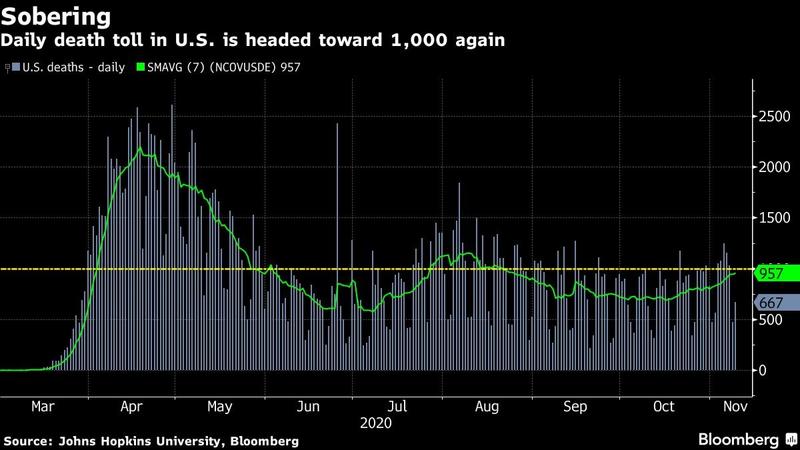
US
The number of confirmed COVID-19 cases in the United States increased over 200,000 in the past 24 hours, hitting a new record, according to the tally released Tuesday by Johns Hopkins University.
Coronavirus infections in the US have already surpassed 1 million in the first 10 days of November alone, data compiled by Bloomberg show. The US has seen more than 100,000 cases for six straight days.
The country also had a record 61,964 patients currently hospitalized with COVID -19 on Tuesday, surpassing the April 15 high of 59,940, reached when New York and New Jersey were at the center of the pandemic. In April, hospitalization data wasn’t available for every state. Current hospitalizations have climbed at an average of 1,661 patients per day in the past week.
The New York region showed continued signs of strain, with the state recording the most new cases since early May. Newark, New Jersey’s largest city, will impose a curfew in three hot spots.
The number of patients hospitalized with COVID-19 in California has risen by 32 percent over the past two weeks, and intensive-care admissions have spiked by 30 percent, Dr. Mark Ghaly, the state's health and human services secretary, told reporters.
In Minnesota, Governor Tim Walz announced new restrictions as the Midwestern state reported a fresh record high in daily COVID-19 hospitalizations, and medical systems in Minnesota expressed concerns about their ability to cope with the surge.
France
The Paris region will cross the threshold of more than 99 percent of initial intensive-care unit capacity taken by COVID-19 patients on Tuesday, regional health agency head Aurelien Rousseau said in a tweet.
France registered a total of 1,829,659 confirmed cases of coronavirus on Tuesday, up by 22,180 over the last 24 hours, the health ministry said.
The ministry also reported 472 additional deaths in hospitals from the disease over the last day, adding the numbers had increased sharply over the past week because some institutions were catching up on reporting data that had not been previously given.
Bulgaria
In Bulgaria, a record-high 4,390 daily cases were reported, with the numbers of hospitalized and patients in intensive care units also at their highest. The total number of positive cases in the Balkan country doubled in the past two weeks.
Prime Minister Boyko Borissov, who was treated at home for two weeks and tested negative on Tuesday, has repeatedly rejected the option of a complete lockdown.
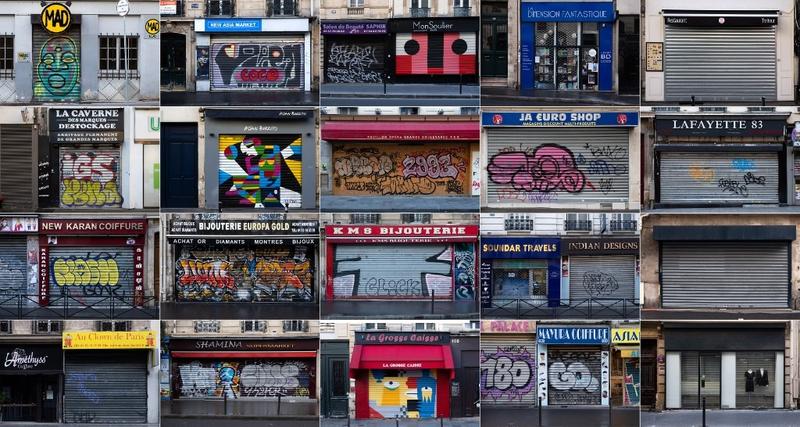 This combination of pictures created on Nov 10, 2020 shows the front of different closed shops in Paris, as France is on a second lockdown aimed at containing the spread of COVID-19. (JOEL SAGET / AFP)
This combination of pictures created on Nov 10, 2020 shows the front of different closed shops in Paris, as France is on a second lockdown aimed at containing the spread of COVID-19. (JOEL SAGET / AFP)
Italy
Italy has registered 35,098 new coronavirus infections over the past 24 hours, the health ministry said on Tuesday, steeply up from 25,271 on Monday.
The ministry also reported 580 COVID-related deaths, against 356 the day before - the highest daily death toll since April 14.
In total, Italy has recorded some 995,463 confirmed infections and 42,330 fatalities.
Italy may need to spend as much as 10 billion euros (US$11.8 billion) a month to aid businesses and workers hit by coronavirus restrictions, according to people familiar with the matter.
Lockdown measures similar to the ones imposed earlier this year are estimated to cost the government between 40 billion to 50 billion euros, or about 3 percent of Italy’s output, if they last until March, said the people, who declined to be identified because the discussions are confidential. Under softer curbs, the aid bill would be at least 6 billion euros a month, they said.
Hungary
Hungary will make mask-wearing mandatory in all public spaces as of Wednesday, Prime Minister Viktor Orban said in an interview on state television.
Orban said further restrictions were needed to contain the spread of the pandemic and avoid hospitals being overwhelmed. The government would review the impact of the lockdown measures in two weeks, he said.
Economic measures would focus on the hardest-hit industries, including hotels and restaurants, in the next month amid the strictest lockdown steps. The government was planning broader stimulus to help other businesses later.
READ MORE: New Dutch cases fall sharply after lockdown, data show

A bus stop ad for COVID-19 testing is shown outside Pfizer world headquarters in New York on Nov 9, 2020. (PHOTO / AP)
Ireland
Ireland will ease travel curbs for arrivals from "red" regions of Britain and the European Union from Nov. 29 by cutting their quarantine period to as little as five days from 14 currently if they test negatively for the virus.
Ireland began implementing the EU's "traffic light" system for non-essential EU travellers this week, ending some of the bloc's tightest controls that were strongly opposed by its two main airlines, Ryanair and Aer Lingus.
People arriving from "green" regions with fewer than 25 COVID-19 infections per 100,000 people in the last 14 days do not need to restrict their movements, neither do those travelling from "orange" areas if they produce a negative test taken in the previous three days.
"Red" regions - those with infection rates of 50 or more per 100,000 and positive tests of 4 percent - must restrict their movement for a minimum of five days before they can take a test that, if returned negative, ends their quarantine, the government said.
Only Greenland is now categorised as a low-risk green region, according to the European Centre for Disease Prevention and Control (ECDC), with Finland, Norway and parts of Greece deemed to be orange.
Chile
More than half a million people in Chile have recovered from the novel coronavirus (COVID-19), Chilean Minister of Health Enrique Paris said on Tuesday.
Some 523,907 people have tested positive for COVID-19 in the South American country since the onset of the outbreak here, and of those, 500,142 have recovered, said Paris.
The positivity rate in the past 24 hours has been 4.53 percent nationwide and 2 percent in the capital Santiago and metropolitan area, while the number of new cases declined by 4 percent in the past two weeks, he said. In its daily report, the Ministry of Health said the COVID-19 death toll stands at 14,611.
ALSO READ: Putin says 'all Russian COVID-19 vaccines are effective'
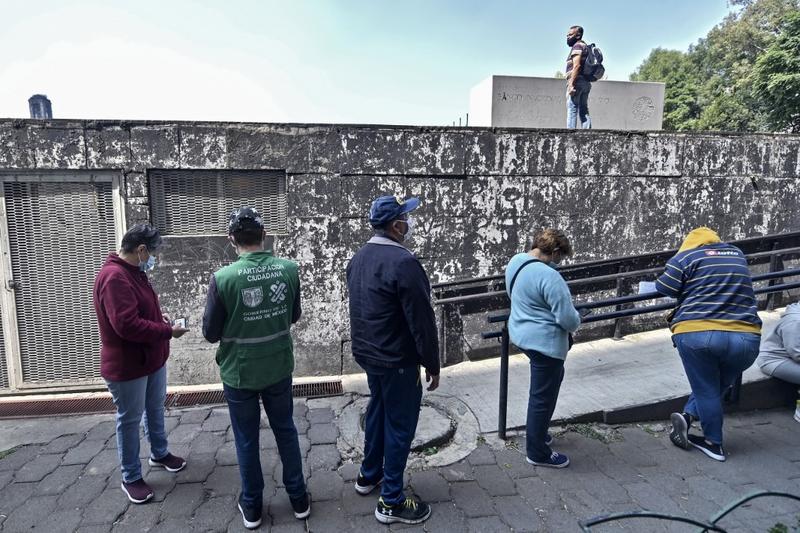 People queue to be tested for COVID-19 by health worker of the city government, in Tlatelolco neighbourhood in Mexico City on Nov6, 2020, amid the novel coronavirus pandemic. (PEDRO PARDO / AFP)
People queue to be tested for COVID-19 by health worker of the city government, in Tlatelolco neighbourhood in Mexico City on Nov6, 2020, amid the novel coronavirus pandemic. (PEDRO PARDO / AFP)
Brazil
Brazil's COVID-19 cases exceeded 5.7 million after registering 25,012 new cases in the last 24 hours, the Ministry of Health said Tuesday.
Meanwhile, 201 more deaths from the disease were reported, raising the national death toll to 162,829.
According to the ministry, the number of deaths and cases nationwide is likely to be higher as five states did not update their data on Tuesday.
Brazil currently ranks second worldwide in terms of COVID-19 deaths, only behind the United States, and third in terms of confirmed cases, following the United States and India.
Mexico
Mexico's health ministry on Tuesday reported 5,746 more coronavirus cases and 617 more deaths, bringing the official toll to 978,531 cases and 95,842 deaths. Health officials have said the real number of infections and deaths is likely significantly higher.
Argentina
Argentina is eager to apply an effective vaccine to control the spread of the novel coronavirus (COVID-19), but without sacrificing safety, Argentine Foreign Affairs Minister Felipe Sola said Tuesday.
"Argentina wants a safe, highly effective vaccine as soon as possible, although as soon as possible should not run counter to its safety," Sola said in a statement released by the Ministry of Foreign Affairs.
Sola stressed officials will prioritize safety before mounting a vaccination drive. "If the vaccine is North American, it must be fully approved by the United States' FDA (Food and Drug Administration) and Argentina's ANMAT (National Administration of Drugs, Foods and Medical Devices)," said the minister.
Argentina registered its first case of COVID-19 on March 3 and as of Monday, reported a total of 1,250,499 confirmed cases of infection and 33,907 deaths from the disease.
Morocco
Morocco announced on Tuesday 5,214 new COVID-19 cases, taking the tally in the North African country since March 2 to 265,165.
The number of recoveries from the coronavirus in Morocco increased to 216,851 after 3,946 more were added, while the death toll rose by 69 to 4,425 the Ministry of Health said in a statement.
Kenya
Kenya on Tuesday appealed to the international community to promote equitable access to COVID-19 vaccine amid the latest breakthrough at the late-stage trials conducted by leading manufacturers.
Patrick Amoth, director-general of health in the Ministry of Health said that Kenya has welcomed the announcement of the development of an effective and safe vaccine that will boost efforts to contain the pandemic.
"COVID-19 vaccines are a global public good for health that should be accessed by countries in a fair manner," Amoth told a virtual World Health Organization (WHO) assembly from the capital, Nairobi.
Sudan
Sudan's acting Health Minister and two senior officials of the Health Ministry contracted COVID-19, the ministry announced Tuesday.
"Sudan's acting Health Minister Osama Ahmed Abdul Rahim together with the director of general administration for basic health care and director of general administration of therapeutic medicine have tested positive for coronavirus," the ministry said in a statement.
The ministry added that the infected are receiving treatment and are in good health condition, pointing out that the health minister is performing his ministerial work from the health quarantine.
In the meantime, the higher committee for health emergencies in Sudan urged the citizens to reduce gathering and travel during public holidays to curb the spread of the disease.
 A man is tested at the Utah National Guard's mobile testing site for COVID-19 Nov 10, 2020, in Salt Lake City. (PHOTO / AP)
A man is tested at the Utah National Guard's mobile testing site for COVID-19 Nov 10, 2020, in Salt Lake City. (PHOTO / AP)
Ethiopia
The Ethiopian Ministry of Health on Tuesday said the country's total number of confirmed COVID-19 cases hit 100,327, after 345 new cases were reported.
According to the ministry, the new cases were discovered out of 4,360 COVID-19 medical tests that were conducted in the east African country during the last 24 hours.
Ethiopia had conducted 1,534,470 COVID-19 medical tests so far, it was noted. The ministry also disclosed that the number of COVID-19 related deaths in the country reached 1,537 as of Monday, after seven new COVID-19 related deaths were reported during the last 24-hour period.
The ministry said that some 61,516 patients who tested positive for COVID-19 had recovered so far, including 806 in the last 24-hour period.
Ethiopia's capital Addis Ababa is currently the epicenter of the COVID-19 pandemic, with more than 50 percent of all confirmed COVID-19 cases, according to the ministry. Some 61 percent of all COVID-19 cases in the east African country are males.
Libya
The National Center for Disease Control of Libya on Tuesday reported 970 new COVID-19 cases, bringing the national tally to 70,010.
Meanwhile, 732 more recoveries and 13 more deaths were registered, taking the counts to 41,512 and 957 respectively, said the center.
Since the first case was reported in March, Libyan authorities have taken a series of precautionary measures against the pandemic, including closing the country's borders, shutting down schools and mosques, banning public gatherings and imposing a curfew.


